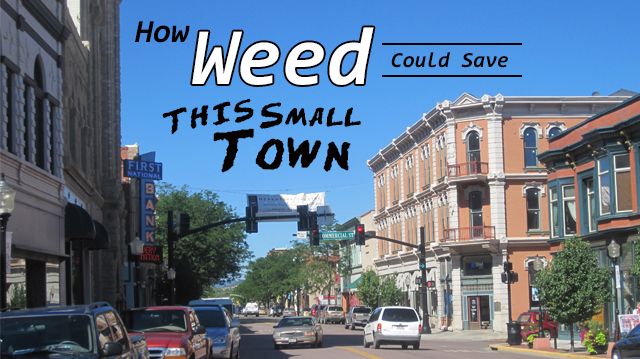Trinidad, Colorado: The city where Bat Masterson was marshal, Doc Holliday practiced dentistry—and owned a brothel—and Jesse James’ gang ran around, is now a major hub for legal marijuana. The industry has taken off so well in the town in fact, that city officials are excited by the promise of revitalizing the quiet town through marijuana tax revenue to turn it back into a bustling town.
The rural southeast Colorado town is located just 11 miles from the Colorado-New Mexico border and was once a booming coal mining town. In the early 2000s, Trinidad gained notoriety for being one of the first places in the nation where one could receive gender reassignment surgery. It quickly earned the unofficial title of “sex change capital of the world.” But since then, Main Street has been quiet. That is until retailers in Colorado began selling legalized marijuana in 2014.
Trinidad started slowly. “It’s like tipping your toe in the water, testing the water,” said mayor pro tem, Anthony Mattie. “And we said, ‘Alright, this is not the big problem we maybe thought it was going to be.’”
In fact, getting into the marijuana business has proved to be much better than anyone could have anticipated. After only allowing medical marijuana businesses at the start of 2014, by November, the first recreation retail marijuana shop opened in town. City manager Gabe Engeland said they had anticipated collecting $200,000 in tax revenue from legal pot sales, but the city collected $800,000 in taxes in just one year. Pot sales make up around 10 percent of Trinidad’s general fund.
There are now eight dispensaries in town, and more change is already on its way. Old water pipes, many of which were installed between 1890 and 1950 and were literally falling apart in some places, have been replaced, and the city was able to buy a pumper truck for the fire department. Several rundown buildings in town have been purchased by the city and plans are already in the works to turn them into live-work buildings to attract artists and other creatives to town.
Legal pot sales have significantly impacted the economy throughout Colorado since the state legalized weed sales. In February 2015, The Washington Post reported that the industry amassed $700 million in revenue. Retailers sold $386 million in medical pot and $313 million worth of recreational marijuana. The state received $63 million in tax income and another $13 million for licenses and fees. Experts predict that the Colorado pot industry will hit $1 billion by the end of this year.
That’s great news for places like Trinidad, where buildings and infrastructure are no longer falling into disrepair and neglect. Despite some residents’ distaste for the industry, crime rates haven’t raised significantly. In fact, as CNN reports, the number of burglaries has gone down, weed-related crime reports have decreased and even DUIs are lower than ever, “dropping from 59 in 2014 to 29 in 2015.”
Dispensaries and edibles chefs are excited about the industry’s growth in town, hoping to build business while helping, or even saving, Trinidad.
Currently, 24 states have legalized marijuana for medicinal purposes. Colorado, Washington, Oregon, Alaska and the District of Columbia have legalized it for both medicinal and recreational reasons. Will other states look to the economic expansion in Colorado and consider following its lead? Pot lovers and advocates sure hope so.
—Megan Winkler
Megan Winkler is an author, historian, Neurosculpting® meditation coach, certified nutritional consultant and DIY diva. When she’s not writing or teaching a class, Megan can be found in the water, on a yoga mat, learning a new instrument or singing karaoke. Her passion for a healthy mind-body-spirit relationship motivates her to explore all the natural world has to offer.
Sources:
http://www.cnn.com/2016/04/20/health/trinidad-colorado-small-town-marijuana/index.html?eref=rss_topstories
https://www.washingtonpost.com/news/wonk/wp/2015/02/12/colorados-legal-weed-market-700-million-in-sales-last-year-1-billion-by-2016

